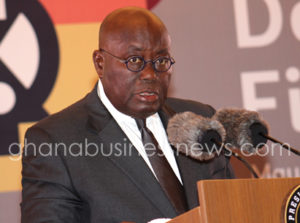Sound business climate prerequisite for poverty alleviation in Africa – President

Africa can only surmount the challenge of eradicating poverty when the Continent establishes business-friendly economies that attract both foreign and local investment, President Nana Addo Dankwa Akufo-Addo has indicated.
This, he said, was an effective way to creating a society of opportunities for Africa’s youth, leading to the construction of optimistic, self-confident and prosperous nations.
President Akufo-Addo made this known Tuesday when making an intervention on how to improve the business environment to generate and attract more private investment in Africa and boost job creation and growth, at the Africa-Europe High-Level Forum in Vienna, Austria.
The Forum, under the theme: “Taking Co-operation to the Digital Age,” was an initiative of the Austrian Chancellor Sebastian Kurz, and Rwandan Leader Paul Kagame. It brought together European and African leaders, together with chief executive officers of major global companies, innovation champions, start-ups and other stakeholders.
The high-level meeting, a springboard to leverage on other interventions, which seeks to enhance the quality of cooperation between Africa and Europe, and for its leaders to reflect and act to secure prosperity and competitiveness on both continents, and deepen the relationship in all aspects with a specific focus on taking cooperation to the digital age.
President Akufo-Addo said with the Continent’s resolve to eradicate mass poverty and provide its people with a good quality of life, it was important “that we provide the large numbers of African youths with the capacity to build dignified standards of living in Africa.”
Establishing business-friendly economies that attracted investment, foreign and domestic, was an effective way to creating a society of opportunities for our young people, leading to the construction of optimistic, self-confident and prosperous nations.
Towards that realization, President Akufo-Addo suggested that countries reformed their economic governance, which institutionalized fiscal responsibility and discipline.
He submitted that nations restructured their political governance processes to address corruption and unresponsive bureaucracies, and to put focus on productive sectors, and, thereby, address the challenges confronting the critical sectors of agriculture, ICT and industry.
The President further proposed the improvement of the business environment to help remove administrative bottlenecks, and formalise the economy; and for nations to guarantee access to education and healthcare for its peoples.
“We are following this path in Ghana, and have achieved modest successes, such as a GDP growth rate of 8.5% in 2017, estimated at 7.9% in 2018, with the same projection for 2019. Indeed, all the macroeconomic indicators are pointing in the right direction, evidenced by the recent decision of some of the world’s largest companies to set up shop in Ghana.
“We believe we are on the cusp of a bold, new beginning in Ghana, building a Ghana Beyond Aid, which will repudiate the recent culture of failure,” the President told the gathering.
Other Speakers at the event also placed premium on the fact that Africa ought to create the right climate for investment, because it remained the continent that attracted the smallest quantities of investment.
The Continent needed enough investment, strong enterprises, rapid education and infrastructure development to match bigger economies, and in the process solve the problem of poverty and migration.
Source: GNA
